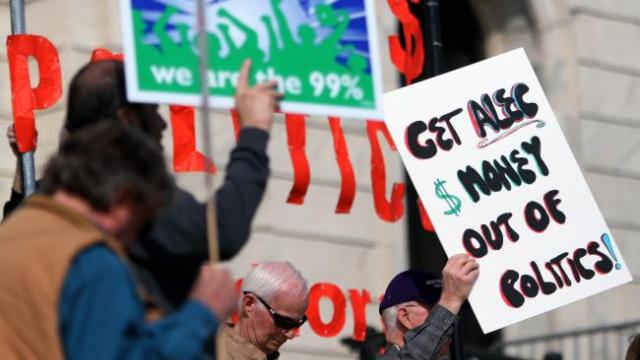
Photo: Minnesota Public Radio
Late last week, the candy company Mars, Inc. and the Arizona Public Service Company (Arizona’s largest electric utility) became the latest in a group of high-profile companies to part ways with the American Legislative Exchange Council. They join Kraft, Wendy’s, McDonald’s, Coca-Cola, PepsiCo, Intuit and the Gates Foundation.
ALEC, as the group is better known, describes itself as “a constructive forum for state legislators and private sector leaders to discuss and exchange practical, state-level public policy issues.” Its critics call it a way for big corporations to impose their will through state law—laws that have eased taxes and regulations on big companies while restricting the rights of immigrants, workers, and minorities.
So why are companies leaving ALEC? What are we to make of this trend? Well, here are a few things this exodus is not.
Only about Stand Your Ground
ALEC’s connection to Stand Your Ground laws, of the type that initially shielded George Zimmerman from prosecution in the killing of Trayvon Martin, is a big reason why the group is finding itself in uncomfortable headlines these days—but it’s far from the only one. ColorofChange.org, the group that’s been calling for corporations to leave ALEC, actually began to do so late last year due to ALEC’s role in promulgating voter ID laws that suppress the voting rights of poor and minority voters. Some of the companies whose departures were publicized last week, including Pepsi, Wendy’s, and Intuit, actually left ALEC by letting their memberships quietly expire during the winter.
Just about Corporations
Yes, company departures are the main event right now, but the exodus is unlikely to stop there. At least one state legislator has publicly left the group (ALEC, he wrote, “is not the innocuous, bipartisan organization it purports to be. Their agenda is radical and wrong for Missouri. I was a member and saw firsthand the sort of extreme legislation they push on state legislators around the country”). Groups in a number of states are pressuring their elected officials to leave ALEC and write their own legislation. And the Bill and Melinda Gates Foundation, not a corporate member but a charitable foundation, has announced it will make no new grants to the group.
A Sign That These Companies are Getting Religion
These companies have all engaged in lobbying in the past, and will surely continue to do so. Even in their departure statements, none has been apologetic about the initial decision to join ALEC—some have cited business or financial reasons for leaving; others have affirmed that they joined for a certain purpose but don’t want to be publicly associated with ALEC’s other activities.
Likely to Stop Here
Shareholders of at least five publicly traded companies have already introduced resolutions asking for disclosure of involvement in organizations, like ALEC, that write and promote model legislation. And ColorofChange.org and other activist groups already have moved on to new boycott targets, including Johnson & Johnson, AT&T and State Farm.
The Only Fight That Matters
It’s great that ALEC is facing so much public scrutiny. As Paul Krugman writes, “ALEC, even more than other movement-conservative organizations, is clearly playing a long game. Its legislative templates aren’t just about generating immediate benefits to the organization’s corporate sponsors; they’re about creating a political climate that will favor even more corporation-friendly legislation in the future.” But we have to remember that ALEC is a tool for this agenda, not its source—and not the only tool, either.
A Coincidence
ALEC’s ubiquity in the news has come rather suddenly; it’s easy to overlook the fact that the organization has been operating for 39 years. So why is it getting so much attention now? According to a statement from ALEC, the reason is a “coordinated intimidation campaign against its members.” Well, sort of. Scrutiny of ALEC kicked into gear after an investigation revealed their role in helping the private prison industry craft Arizona's infamous anti-immigrant law, and increased as extreme ALEC-backed laws rippled through state legislatures last year.
Progressive media, in particular, deserves a lot of credit for keeping the microscope on the group. As state after state passed nearly identical policies protecting businesses at the expense of people and the environment, progressive groups realized they were facing a coordinated campaign to undermine basic protections—and that they needed a coordinated response. Mobilizing people to boycott individual corporations when they behave poorly is a time-honored method. Still, the goal isn’t, as ALEC alleges, “to eliminate discourse” but to create it. Calling efforts to find out how and why our laws get written anti-democratic is a pretty absurd stretch.
So what is happening? Investigative reporting and consumer pressure are turning ALEC into a toxic brand—think of the mass exodus of Rush Limbaugh advertisers earlier this year. Corporations and others are finding it's no longer in their best interest to be associated with it. The departures represent an important and hopeful trend, but just the beginning of a necessary reevaluation of how special interests distort the democratic process.
3 WAYS TO SHOW YOUR SUPPORT
- Log in to post comments











